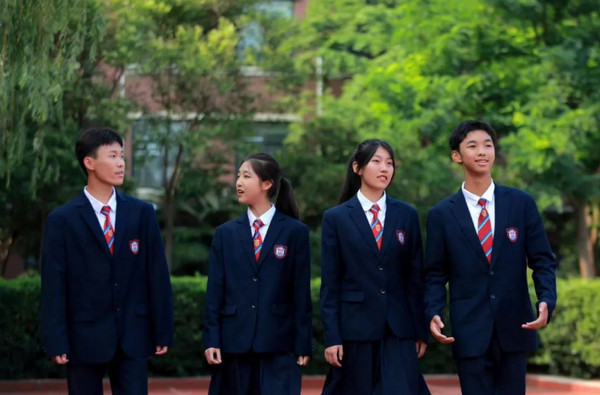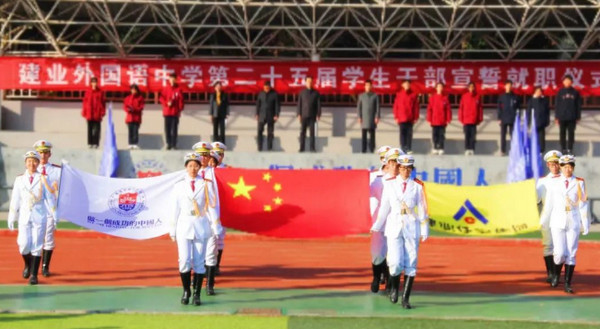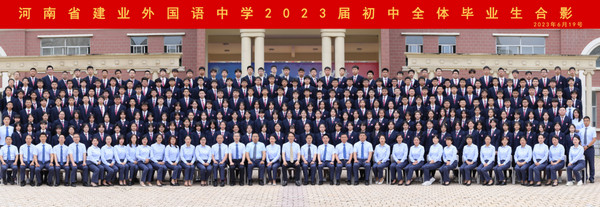建业外国语中学国际部特色:IB课程
Characteristics of International Department of Jianye International School:
IB course
建业外国语中学以“个性化 多元化 国际化”为办学特色,学校的“五学智慧课堂”从理念到实践都与IB理念和授课方式颇为相近,目前已经成为IB官方认证候选学校。至此,建业教育成为河南省唯一实现幼、小、中IB一体化的教育单位。
IB课程以学生为本,把学生置于IB教育的中心位置,IB课程有十大培养目标:积极探究、知识渊博、善于思考、善于交流、坚持原则、胸襟开阔、懂得关爱、敢于尝试、均衡发展、及时反思。IB致力于将年轻人培养为具有以上属性的终身学习者,这样的年轻人无论是独立的,还是与他人合作的,都能够帮助人们成为当地、国家和全球社区中负责任的成员,并能应对迅速变化着的复杂世界所带来的各种挑战和机会。
IBMYP(中学项目)由8个学科组构成:语言习得(英文)、语言与文学(中文)、数学、个体与社会、科学、艺术、设计、体育与健康。课程具有4个特点:广泛、平衡、概念驱动、相互联系。通过8个学科组的学习和学科组之间的跨学科学习,确保学生理解的广度和深度。IB教学逻辑的核心是“探究-行动-反思”即“一种询问-做-思考”的相互作用。当代教育研究表明,成功的教学成果是:教师与学生的深刻的关系塑造+知识的输入与输出。IB为教师提供了6种教学方法,旨在让教师灵活的选择具体的策略,最好输出自己的教学内容和适应不同学生的需要。IB旨在让所有学生成为自我调节的学习者,他们知道如何提出好的问题、制定有效的目标、追求他们的渴望、并有决心实现它们。对于学习者来说,学会如何学习至关重要。IB五类相互关联的技能,以及与它们相关的各种从属技能,可以帮助所有年龄段的学生成长为能够自我调节的学习者,促进他们的能动性。这5类相互关联的学习方法是:思考技能、研究技能、交流技能、社交技能、自我管理技能。
建业中学坚持“教、学、评”一致性的教学要求,通过评价与反馈让学生更有效地掌握学习方法,从而激发学生的内在学习驱动力,使学生在笔试中取得成功,并且在知识应用解决生活问题方面也取得成功。经过IB课程的培养,可以使学生成为终身学习者,实现自己的理想并为创造更美好的世界贡献自己的力量。
Jianye International Language Middle School is characterized by "personalization, diversification and internationalization". Its "Five Learning Smart Classroom" is quite similar to IB's concept and teaching method from concept to practice, and has become a candidate school for official certification of IB. So far, the construction education has become the only educational unit in Henan Province to realize the integration of children, children and middle school IB.
The IB curriculum is student-oriented and puts students at the center of the IB education. The IB curriculum has ten major training objectives: active inquiry, profound knowledge, good at thinking, good at communication, adhering to principles, open-minded, caring, daring to try, balanced development, and timely reflection. IB is committed to cultivating young people as lifelong learners with the above attributes. Such young people, whether independent or cooperating with others, can help people become responsible members of local, national and global communities, and can cope with the challenges and opportunities brought by the rapidly changing complex world.
IBMYP (Middle School Project) is composed of eight subject groups: language acquisition (English), language and literature (Chinese), mathematics, individual and society, science, art, design, sports and health. The course has four characteristics: extensive, balanced, concept-driven and interconnected. Ensure the breadth and depth of students' understanding through the study of 8 discipline groups and interdisciplinary study between discipline groups. The core of IB teaching logic is "inquiry - action - reflection", that is, "a kind of interaction of inquiry - doing - thinking". Contemporary education research shows that the successful teaching results are: shaping the profound relationship between teachers and students+input and output of knowledge. IB provides six teaching methods for teachers, aiming at allowing teachers to choose specific strategies flexibly, and it is better to output their own teaching content and adapt to the needs of different students. IB aims to make all students become self-regulated learners. They know how to ask good questions, set effective goals, pursue their aspirations, and have the determination to achieve them. For learners, learning how to learn is crucial. The five interrelated skills of IB, as well as various subordinate skills related to them, can help students of all ages grow into self-regulated learners and promote their initiative. These five interrelated learning methods are: thinking skills, research skills, communication skills, social skills, and self-management skills.
Jianye International School adheres to the consistent teaching requirements of "teaching, learning and evaluation". Through evaluation and feedback, students can grasp learning methods more effectively, thus stimulating students' internal learning driving force, making students succeed in the written test, and also in the application of knowledge to solve life problems. Through the cultivation of IB courses, students can become lifelong learners, realize their dreams and contribute to the creation of a better world.




































 您的位置
您的位置



